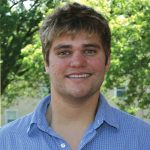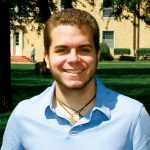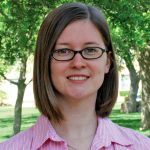The 2011 seniors awarded Fulbright grants for English Teaching Assistantships share their Statement of Grant Purpose essays, part of the application process.
 STATEMENT OF GRANT PURPOSE
STATEMENT OF GRANT PURPOSE
Christiana Bay, Korea, English Teaching Assistantship
Teaching in Korea is an exciting prospect, for many reasons, personal and professional. Let me touch on the personal reasons first. I am very interested in East Asia and have been since the summer I turned ten years old. That summer I attended a language and cultural camp at the Chinese Community Center in Houston, Texas where I learned some Chinese, Japanese, and Korean. I particularly remember fabric painting with my Korean counsellor and our East Asian art appreciation classes. Fond memories of camp influenced my decision to take Japanese when my high school offered the language my junior year and three semesters at Austin College.
I enjoy learning, which is one reason I want to teach. This is a personal reason but also a professional aspiration. Education is a collective effort. Both student and teacher must work together in order to achieve a common goal, in order to keep the learning process exciting and productive. My educational psychology class in college emphasized the power of catering to each child’s needs despite individual strengths and weaknesses. We also learned about Lev Vygotsky’s concept of the “zone of proximal development,” the amount a student can do with help and what he or she can do without help.
A teacher’s objective is to try to hit the center of this zone, to help students enough so they are not struggling and floundering, but to also allow them to solve problems for themselves. Teamwork within the classroom is essential; a teacher should experience each trial and each accomplishment with each student.
As an educator, the challenge is in discovering the tools to inspire involvement, satisfaction, and a love of learning in students. The dream of every teacher is to have a class that is motivated to learn. In my International Economics class I learned about the “Miracle on the Han River,” Korea’s electrifying economic growth since 1970. In that period South Korea became a strong, industrious competitor. That took perseverance by South Korea’s citizens. I see South Korea as a confident, motivated nation, with confident, motivated people.
The chance to teach and, in the process, touch the lives of committed students is an extraordinary opportunity. I want to learn from my students as they learn from me, confronting the “teaching challenge” with zest and success. I hope to use the unique lessons from my students toward a master’s in psychology working with children and adolescents as well as career in writing novels for young adults. To be a teacher, one must be supportive, there for the students in and outside of the classroom. Working with students of the age I want to counsel for will further my knowledge of their intrapersonal and interpersonal interaction, helping me devise healthy, helpful ways to advise.
I strongly believe the Fulbright experience will help me both in my future professional wishes and my personal endeavours. I one day plan to have children of my own; as a teacher I will learn patience, commitment, dedication and discipline, all marks of a parent. However, most of my hopes for my post-Fulbright ventures are attached to the Korean students I will be working with rather than myself. I want them to learn as much from me as I learn from them, creating the classroom into a haven of communication, into a safe learning environment where each student can hopefully feel comfortable answering questions or making mistakes. I intend to leave Korea with an imprint of memories from my students, lessons learned for my own personal growth, but also to have given them a love to continue their own education.
 Statement of Grant Purpose
Statement of Grant Purpose
Cameron Behal, South Korea, English Teaching Assistantship
No form of study can fully prepare someone for the experience of totally immersing themselves in a foreign culture. This is what I was thinking as I emerged from the thick Ecuadorian jungle into a small clearing and looked at the Kichwa Indian village where I was to live and work for weeks to come. I had received a scholarship from my college to work with an organization specializing in community development for about a month of my summer after my sophomore year. Even though the Kichwa spoke Spanish, I soon learned that their culture was far from anything I had ever even read about. Whether it was sharing a cup of chicha (an indigenous drink made from yucca root) with an elder before work in the cocoa fields or teaching children at the school, I learned the most from this experience from being, as some would say, totally “out of place.”
Throughout my undergraduate study, I have been putting myself “out of place” in areas that most would never dream of seeing me. The summer after my freshman year I worked with Iraqi, Kenyan, and Burundian torture victims at a non-profit in the Dallas area and after my sophomore year was my experience in Ecuador. This past spring I immersed myself in the Catalan culture while studying abroad in Barcelona. To many of my friends and some family members it seems as if my decision to pursue a Fulbright Teaching Assistantship in South Korea is merely a perpetuation of this cycle. But, varied as my international experiences may be, through them I have developed an interest in international education.
Even though my connections with Korea are limited, I wish to learn more about their education system because it is quickly becoming one the foremost in the world. If foreign teaching assistants are allowed to study such an advanced system of education then it will be possible to use this knowledge in lesser developed countries, instead of relying on a purely western model. While working in Ecuador I learned that many international non-profits use an educational model that is ineffective at times. Positive change cannot be expected if these models are out of date or simply not appropriate for the area. Being “out of place”, which I feel is inevitable for me in Korea, has had its advantages for me in the past. In Ecuador, I felt energized from tasks in the classroom. My students’ earnest desire to learn put pressure on me as a teacher to devise meaningful, thought-out lessons that did not end when the time came to work in the fields, but carried on all day long. I believe teaching in South Korea will give me an opportunity to gain this kind of partnership with a community, all the while learning of a vastly different culture and educational heritage.
Throughout college, community development and international education have become my biggest interests. In addition to teaching English, I would also like to continue mentoring children as I’ve done through Big Brothers Big Sisters. Through my involvement with this organization for the past three years I’ve learned that being available to students to simply talk outside of the classroom can be just as important as the academic work inside. By pursuing a combination of service in the classroom and mentoring outside I can develop a better grasp on international education and service as a whole. This would provide me with a much stronger potential to serve both the U.S. and international community with a greater level of understanding.
 STATEMENT OF GRANT PURPOSE
STATEMENT OF GRANT PURPOSE
Erin Elizabeth Sweeney, Croatia, English Teaching Assistantship
I was nearly three years old when war broke out in the newly formed Republic of Croatia.
Half a world away from the violence, most Americans were concerned with their own war in Iraq, a sluggish economy and the upcoming election cycle. While my country again struggles with these issues, in two decades, the political, social and economic landscape of Croatia have dramatically transformed in an ongoing process which I would be honored to help facilitate.
A model for other Balkan nations seeking closer ties with the West, Croatia’s anticipated accession to the European Union provides substantial reason to hope for the country’s future, while highlighting its need for English teachers.
Working as an independent instructor in Moldova challenged my ability to translate cross-cultural dissimilarities in and outside the classroom, yet produced the confidence and adaptability necessary for teaching English in an unfamiliar environment to students of varying skill levels. Provided with only a piece of chalk, a few workbooks and brief internet access approximately once a week, I developed a curriculum and lesson plans for my 170 students across 7 grade levels.
Among other projects, students wrote original poetry, created political parties which enthusiastically participated in class debates and mock elections, wrote and produced parodies of their favorite films, and even participated in an Amazon jungle survival simulation. I am firmly convinced that these teaching methods, though nontraditional, were critical to not only improving my pupils’ English fluency, but also developing a gratifying dialogue between our cultures. Whether I work at a Croatian university or in lower-level education, I hope to engage my students’ creative abilities to make English not simply enjoyable, but a life-long passion.
The current financial crisis has moderately handicapped the Croatian economy due to decreased tourism, which composes 20% of the GDP, and because the severely debt ridden government, which by some estimates accounts for 40% of the GDP, must borrow funds for current expenses at higher than normal cost to citizens. I hope that through our classes, students will better understand American perspectives; increased trust between our two nations could contribute to a solid foundation for stronger international business and diplomatic relationships.
Foreign investment as a result of this closer partnership would enable Croatia to more quickly satisfy EU debt restructuring requirements and direct needed money into the education sector.
Furthermore, facilitating communication between Croatia and America by increasing English fluency could eventually result in improved national security; as a NATO partner, Croatia might become vital to countering threats from that region through information-sharing.
In my time outside the classroom, I intend to either start or build a library of English books accessible by students and the community. A love for the English written word will not only complement their education through increased vocabulary and reading practice, but will also expose them to some of the greatest works of Western literature and philosophy.
By gaining a better understanding of Croats through direct interaction with them, I will be able to dispel falsehoods and educate fellow citizens about Croatian culture at home. As a practicing Roman Catholic, I am intimately acquainted with the religious ideology of the vast majority of Croats and am thus uniquely prepared to understand their often religiously influenced political outlook.
 STATEMENT OF GRANT PURPOSE
STATEMENT OF GRANT PURPOSE
Matthew Lawrence Varvir, Korea, English Teaching Assistantship
I was first introduced to Korean culture by being kicked in the face at the age of eleven. I had already earned a green belt in karate before this point but had found the techniques to be unrealistic in a modern environment. When I stepped into a school that developed its core tenets from tae kwon do, I was immediately astounded by two points: the strength and effectiveness of the Korean techniques (which, as I said, were quickly demonstrated) and the beautiful artistry and flow that were sewn into every strike. Originally confused by this dichotomy, I came to realize that the potency of tae kwon do was due to this ability to focus equally on opposing ideas. For instance, a balance was emphasized between physical discipline and mental dedication. The body must be trained, but the mind was required to memorize and understand the Korean history and culture that was embedded in every pattern of techniques.
This mental tenacity extended far beyond the martial arts. My high school calculus teacher, Ms. Lee, was a native Korean who had immigrated to the United States. While many mathematics instructors avoid teaching the conceptual reasoning behind calculations, she would cover on all aspects of her subject thoroughly. Her focus was inspiring. Ms. Lee’s approach to the material was unique to my experiences in its treatment of mathematics as a language. When treated as alien as a foreign tongue instead of as simple as common sense, the subject could be approached in a much more focused, pragmatic manner. Her methods allowed me to smoothly transition to college-level mathematics. Additionally, the rewarding experience she provided me with would later influence my decision to think of teaching as my proper direction in life.
I have been alarmed by the many situations I have witnessed in which a lack of communication has placed people in peril. I grew up in a community with an extremely large Hispanic population and was introduced to these communication difficulties when I took a summer position working in a warehouse with a diverse staff. Considering that no one had mastered both English and Spanish, it became quickly apparent that a universal language was necessary when dangerous manual labor was taking place. I had to use nonverbal communication to my advantage, expressing my thoughts through facial expression and gesture, acting through pantomime. My training in the theatre arts is substantial, but the utilization of this universal, nonverbal form of exchanging information became most developed when spoken language barriers were present.
I have been teaching others since I was in elementary school. For a decade, I taught martial arts classes to students ranging in ages from three to sixty. I have acted as a theatrical director and dance choreographer on numerous occasions. Recently, I was employed as an intern for Theatricks, a Sherman-based program dedicated to theatrical education, where I taught the basics techniques of acting to both children and teenagers as well as learned how to produce high-quality theatre in a low-budget environment.
The diversity of my teaching experiences has increased in college as well due to my position as a physics department teaching assistant. Each of these activities has enhanced my abilities as an educator, the role which I intend to pursue professionally, and I have gained ample experience teaching martial arts, theatre, dance, and science. (Outside of language instruction, I would hope to work with others in any of these subjects, giving students my knowledge while learning in turn, as well as obtaining a whole new cultural perspective.) But, my development is not yet complete. An ideal teacher must balance material and subject matter with charisma and entertainment, be dedicated in giving their academic focus the attention it deserves, and, above all else, communicate. I believe that the people of the Korean nation would allow me to evolve from a good teacher into an ideal one.
 STATEMENT OF GRANT PURPOSE
STATEMENT OF GRANT PURPOSE
Katherine Wilshusen, Germany, English Teaching Assistantship
I never thought I would be able to speak a foreign language, and yet today I find myself exploring a future in a foreign country teaching the English language and American culture. When I first began learning German my freshman year of college, compelling courses, great professors, and, in particular, a handful of unique learning experiences proved to me that speaking a foreign language was indeed achievable. The most inspirational and useful experience I had was my contact with German citizens. I want to undertake a Fulbright Teaching Assistantship because I believe I can employ what I have learned as a student and tutor of foreign languages to motivate young German students to become fluent in English.
The most significant learning experience I had at college was living in a German language dorm. By living there, I became neighbors with a native speaker of German close to my own age. This connection brought German alive for me, not as a language in a textbook, but as an integral part of a different culture. This friendship profoundly expanded my insight into German culture by introducing me to music, movies, and topical issues that are not readily accessible to a foreigner. Feeling linked to German culture through native speakers motivated me to quickly gain fluency and meet more Germans. Experiencing how this one contact changed my attitude toward language learning so profoundly, I know how I, as a native English speaker, can likewise kindle the same excitement in German students studying English.
Determined to gain fluency and better understand the culture, I spent my junior year in Mainz, Germany. During this year I edited theses for German students and discussed with them the fine details of English writing. I also offered an English “coffee hour” for students about to take their final oral exams, where I would pose them questions about their topics. This gave them the chance to get comfortable discussing their exam subjects in English and build their conversational vocabulary. This experience introduced me to the other side of language learning by seeing what typical mistakes Germans have when learning my native language.
This year I am working with a German professor to create a German tutoring program at my college for American students I help out in the classroom offering one-on-one attention to students as well as spending a few hours per week outside of the classroom with students offering basic conversational practice for beginners and homework help. I initiated this tutoring program precisely because I recognize what a huge impact contact with peers can make when learning a language. Already, with my first experience listening to students’ questions in class and then talking with others outside of class, I have sparked a stronger curiosity for learning more about German culture.
One of the first things I learned studying in Germany is that American politics are closely followed and analyzed. I was often critically asked about my opinion regarding actions of the U.S. government. Germans loved the opportunity to discuss current events with me, an American citizen. Given my experience, I want to offer an extracurricular conversation class that gives German students the chance to practice their English skills while talking about the American political system and current events. As an international relations major, I could offer students a unique opportunity to learn about an integral aspect of American culture while also improving their language skills.
An ETA in Germany will give me keen insight into whether I want to either pursue a career teaching overseas, in foreign services, or international law. My relationships with Germans were the best motivation for me to learn about their wonderful culture and language. Now I want to be the native speaker that motivates German students to truly explore my culture.
